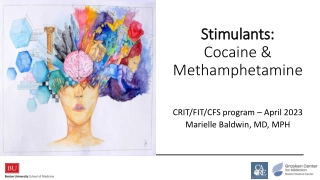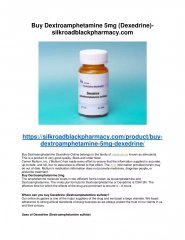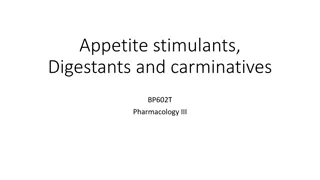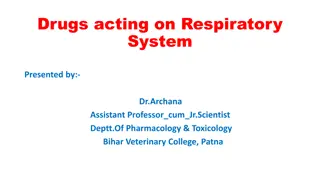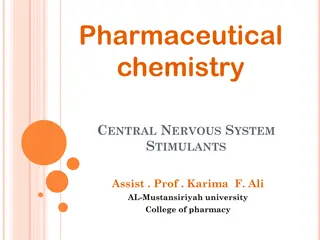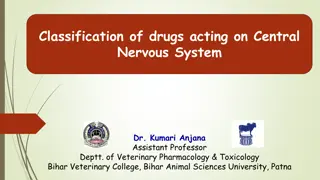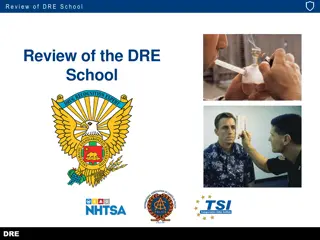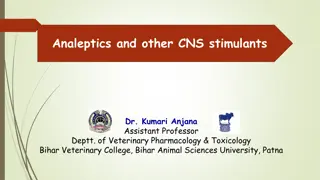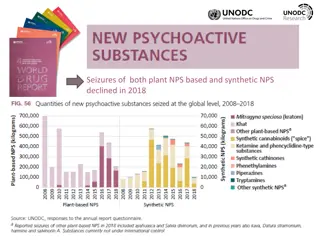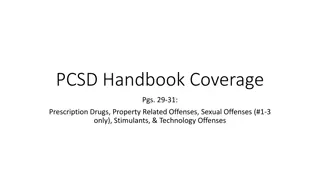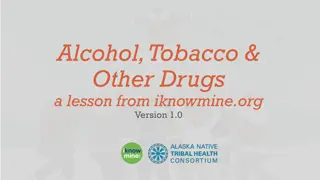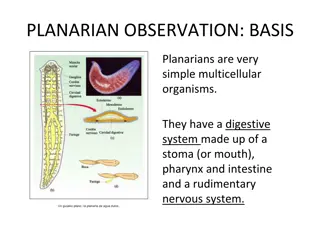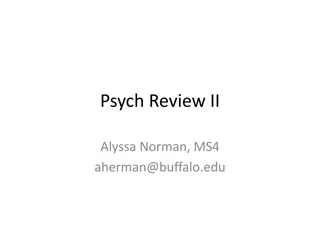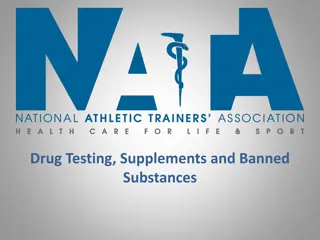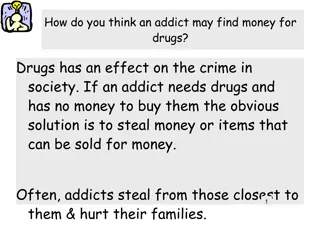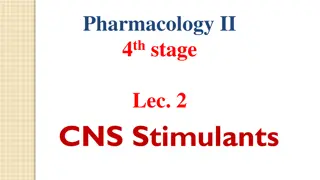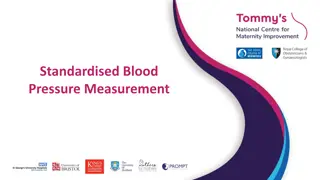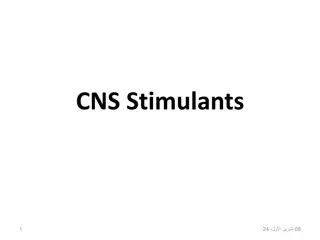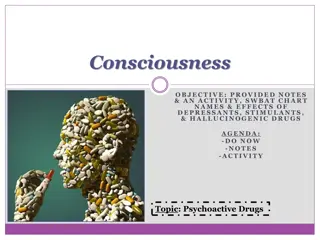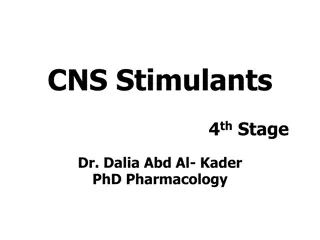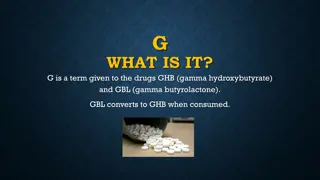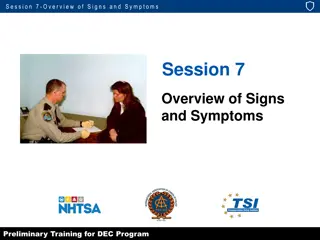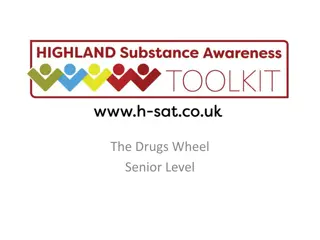Stimulants: Cocaine & Methamphetamine
Basics of cocaine and methamphetamine, including their history, medical complications, treatment options, and techniques to manage overamping.
0 views • 39 slides
Buy Dextroamphetamine 5mg - silkroadblackpharmacy.com
Buy Dextroamphetamine Dexedrine Online belongs to the family of medications known as stimulants. This is a product of very good quality. Book and order Now!\n\nCerner Multum, Inc. (\u2018Multum\u2019) has made every effort to ensure that the information supplied is accurate, up-to-date, and full, bu
1 views • 2 slides
Appetite Stimulants, Digestants, and Carminatives in Pharmacology III
Appetite is influenced by various factors including hypothalamic peptides, catecholaminergic pathways, and serotoninergic signaling. Loss of appetite, like anorexia, can stem from both physical and psychological causes. Alcohol can stimulate gastric secretion but chronic consumption may reduce appet
0 views • 8 slides
Understanding New Psychoactive Substances (NPS) and Their Categories
New Psychoactive Substances (NPS) are substances of abuse not regulated by international drug conventions, posing significant public health risks. These substances can fall under categories like synthetic cannabinoids, stimulants, hallucinogens, and depressants, each with unique risks and effects. S
0 views • 11 slides
Understanding Drugs Acting on the Respiratory System for Effective Treatment
Explore the classification and actions of drugs targeting the respiratory system, including antitussives, expectorants, respiratory stimulants, bronchodilators, and mucolytics. Discover how these medications work to suppress coughs, promote fluidity of bronchial secretions, and stimulate respiratory
0 views • 14 slides
Overview of Central Nervous System Stimulants in Pharmaceutical Chemistry
Central Nervous System Stimulants encompass a diverse group of agents with various effects on the CNS, including analeptics, methylxanthines, central sympathomimetic drugs, and antidepressants. Analeptics are potent CNS stimulants with limited use, while methylxanthines like caffeine have widespread
4 views • 41 slides
Classification of Drugs Acting on Central Nervous System
The Central Nervous System (CNS) plays a crucial role in coordinating the body's functions and responses to the environment. Drugs acting on the CNS can be classified into CNS stimulants and CNS depressants. CNS stimulants include spinal, medullary, and cortical stimulants, with various direct and i
0 views • 10 slides
Understanding Contingency Management in Substance Use Disorder Treatment
Contingency Management (CM) is a technique that utilizes positive reinforcement to encourage desired behaviors, such as abstinence from stimulants. By offering rewards like vouchers or prizes for achieving goals like submitting stimulant-free urine samples, CM aims to combat the positive and negativ
0 views • 6 slides
Current Trends in Recreational Drug Use: Insights and Implications
The trends in recreational drug use have evolved over time, with a shift towards Novel Psychoactive Substances (NPS) such as Synthetic Cannabinoids, Designer Stimulants, and Designer Opioids. Marijuana remains a focal point, now legal in some states for both medicinal and recreational purposes. The
2 views • 26 slides
Review of DRE School and Drug Evaluation Techniques
Explore key topics such as the definition of drugs for DRE purposes, basic drug statistics, review of symptomatology, and vital signs assessment in the context of Drug Recognition Expert (DRE) training. Learn about CNS depressants, stimulants, hallucinogens, and analogs, as well as vital signs like
0 views • 29 slides
Understanding CNS Stimulants: An Overview
Central Nervous System (CNS) stimulants are drugs that stimulate and improve brain functions. They counteract CNS depression caused by various factors but can have adverse effects if overdosed. Categories include psychostimulants, brain stem stimulants, convulsants, and psychotomimetics. Examples su
4 views • 11 slides
Trends in New Psychoactive Substances Seizures and Use
Seizures of both plant-based and synthetic New Psychoactive Substances (NPS) declined in 2018, along with a decrease in global seizures of khat and fluctuations in the use of NPS. Legislation on substances like mephedrone led to a decline in their use, while the use of ketamine increased. NPS use va
0 views • 8 slides
School Handbook Coverage: Prescription Drugs, Property Offenses, Sexual Offenses, Stimulants, & Technology Offenses
The school handbook covers various offenses including possession of prescription drugs, property-related offenses, and technology offenses. It outlines rules regarding medication possession, property damage, and theft on school premises. Students are prohibited from unauthorized possession or distri
0 views • 28 slides
Understanding CNS Stimulants and Their Effects on the Nervous System
Exploring the world of central nervous system stimulants, this content delves into the mechanisms of action of stimulant drugs, highlights the neurotransmitters involved, and discusses the signs and symptoms of CNS stimulation. It covers the use of amphetamine in conditions like narcolepsy, attentio
0 views • 65 slides
Understanding the Impact of Alcohol, Tobacco, and Other Drugs
Explore the effects of alcohol, tobacco, and various drugs on the body, mind, and behavior. Learn about different substances, their impacts, and how our words can shape perceptions. Discover the basics of stimulants and depressants, along with insights into how substances affect the brain and body.
0 views • 14 slides
Understanding Drug Categories and Schedules
Explore the different categories of drugs such as depressants, stimulants, hallucinogens, and inhalants, along with the classification under drug schedules ranging from Schedule I to Schedule V. Learn about the impacts of these drugs on the mind and body, including examples for each category and sch
0 views • 13 slides
Planarian Observation: Nervous System Activity Study
Planarian Observation involves studying the effects of different substances on a planarian's nervous system. Through remote laboratory experiments, observations are made on the movement of planarians in various solutions compared to a control solution. Results are analyzed to determine the effects o
0 views • 7 slides
Understanding Substance Use Disorders and Their Effects
Alyssa Norman, MS4, provides a comprehensive review of intoxication and withdrawal patterns in substance use disorders, highlighting impaired control, social impairment, risky use, and pharmacologic dependence. The content covers various substances, mechanisms of action for stimulants, symptoms of i
0 views • 35 slides
NCAA Drug Testing and Banned Substances Guidelines
The NCAA annually disseminates a list of banned drug classes and provides drug education to student-athletes, including mid-year transfers. Drug testing programs focus on prevention and safety, with sanctions in place to uphold competitive balance. Testing includes steroids, stimulants, and recreati
0 views • 9 slides
Impact of Drugs on Society: A Closer Look
Drugs have a significant impact on society, leading addicts to resort to crime to fund their addiction. With limited availability, addicts may turn to more crime. Punishing street dealers may not solve the root issue, as suppliers can easily find replacements. Social drugs like nicotine, alcohol, ca
0 views • 22 slides
Understanding CNS Stimulants and Their Mechanisms of Action
CNS stimulants are a type of drug that increase certain chemicals in the brain, enhancing alertness, attention, energy, and physical activity. This article explores psychomotor stimulants like caffeine, nicotine, cocaine, amphetamine, and methylphenidate, discussing their mechanisms of action and ef
0 views • 34 slides
Optimizing Blood Pressure Measurement for Pregnancy Care
Accurate blood pressure assessment is crucial for predicting pre-eclampsia and placental dysfunction. The Tommy's app offers a standardized approach, including proper technique, validated monitors, cuff positioning, and multiple parameters like mean arterial pressure (MAP) calculation. It emphasizes
0 views • 8 slides
Overview of CNS Stimulants and Their Effects on the Body
CNS stimulants are drugs that primarily act on the central nervous system, with two main groups being psychomotor stimulants and hallucinogens. Common examples include caffeine, theophylline, and nicotine. These stimulants can have various effects on the body, such as increasing alertness, heart rat
0 views • 14 slides
Understanding Psychoactive Drugs: Depressants, Stimulants & Hallucinogens
Delve into the world of psychoactive drugs, exploring the effects of depressants, stimulants, and hallucinogens on mental, emotional, and behavioral functioning. Learn about the development of tolerance, physical and psychological dependence, and withdrawal symptoms associated with continued use. Di
0 views • 26 slides
Mechanism and Clinical Uses of CNS Stimulants
CNS stimulants, including psychomotor stimulants and hallucinogens, have diverse clinical uses but are also potential drugs of abuse. Psychomotor stimulants such as caffeine affect the CNS by translocating extracellular calcium, increasing cyclic adenosine monophosphate, and blocking adenosine recep
0 views • 29 slides
Understanding GHB, GBL, and 1,4 BD: Types, Effects, and Risks
GHB and GBL, known as G drugs, are controlled substances impacting brain receptors similar to alcohol. They induce varying effects such as euphoria, relaxation, and sedation. Overdosing on these drugs can be life-threatening due to their fine margin between desired effects and toxicity. Combining G
0 views • 12 slides
Overview of Signs and Symptoms in Drug Categories
Explore the indicators and symptoms associated with various drug categories such as CNS Depressants, Hallucinogens, Stimulants, and more. Learn about the signs of impairment and understand the definitions of signs and symptoms related to drug influence. This session provides an in-depth look into sp
0 views • 27 slides
Understanding Drug Categories and Effects with The Drugs Wheel Senior Level
Explore the three basic drug groups - Stimulants, Depressants, and Hallucinogenics - with the interactive activity involving cutting up and arranging segments on The Drugs Wheel. Gain insights and learning from the session led by Mark Adley Version 1.2.31/03/2016.
0 views • 5 slides
